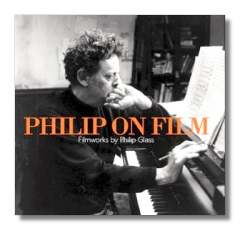
The Internet's Premier Classical Music Source
Related Links
- P. Glass Reviews
- Latest Reviews
- More Reviews
-
By Composer
-
Collections
DVD & Blu-ray
Books
Concert Reviews
Articles/Interviews
Software
Audio
Search Amazon
Recommended Links
Site News
 CD Review
CD Review
Philip Glass

Philip on Film
- Koyaanisqatsi
- Powaqqatsi
- Dracula
- La Belle et La Bête (Selections)
- Music From The Films:
- Anima Mundi
- Kundun
- Mishima
- The Secret Agent
- The Thin Blue Line
- The Man in the Bath
- Evidence
- Diaspora
Janice Felty, soprano
Gregory Purnhagen, tenor
The Kronos Quartet
Monks of the Drukpa Order
Western Wind Vocal Ensemble
Hispanic Young People's Chorus
Philip Glass Ensemble/Michael Riesman
English Chamber Orchestra/Harry Rabinowitz
Nonesuch 79660-2 5CDs
Last spring I attended a live performance of Philip Glass' re-orchestration of the film Dracula (1931). The composer sat in back of the screen playing piano and directing the Kronos String Quartet in a mesmerizing performance. You could barely see them through the haze of clever lighting effects, but during dramatic moments they'd appear more prominent, accompanied by swatches of red light. The music was like a rhapsody for string quartet, more moody than suspenseful, uncharacteristically constant throughout, and tinged with fin de siècle melancholia. Creepy, but not scary. Lyrical, but not sentimental. Here is not just background film music, but a performance event, a fact that eluded some of the local critics.
Composers like Shostakovich, Schnittke, Korngold, and Herriman saw their film music as mostly work-for-hire, artfully executed but not always at the level of their concert and chamber pieces. However, Philip Glass' film music may be his best music. The current collection contains works of blazing eclecticism. Although composed earlier than Dracula's music, Glass' orchestration of La Belle et la Bête is more adventurous, as it creates an opera for Cocteau's film. It is for the most part an aria-less opera, with its characters exchanging brief sprechtstimme passages with one another, but one with intense vocal effects. Glass' music here (oddly reminiscent of Janaçek's) coats the film with dense layers of urgency and thematic propulsion. Since this La Belle et la Bête does not exist as a DVD (yet), listeners can try synching it up with the current video, turning the original sound off. What a shame this collection doesn't have a libretto for the work.
Other CDs in this set include Glass' callow first film, Koyaanisqatsi, a meditative work featuring mantras and a overflowing plate of Glass' quivering arpeggios. While not as successful as the later pieces, the work provides context for the composer's development. The second work in the proposed trilogy, Powaqqatsi uses entirely different effects. Glass mines the vast pampas and valleys of world music, blending his work with South American, African, and Asian dance rhythms. Here he learns how to employ unusual dramatic effects, such as the marriage of percussion with vocalise choruses and the sudden introduction of a new theme before the current one has run out.
The final CD features compilations from his later films such as Kundun (in which the Eastern themes are only suggested), Mishima (where Japanese themes don't even occur), and The Thin Blue Line. This last work is a film about a man unjustly accused of murdering a highway patrol officer. Glass' music for the end credits, with its nostalgic dying falls and repetitive counterpoint, relaxes you, seduces you even, until you hear a car door slam and five shots blasting on the soundtrack. This is quintessential Philip Glass. His sonic intrusion of the real world stays with you long after the deceptively pretty music dies off.
Copyright © 2002, Peter Bates



















